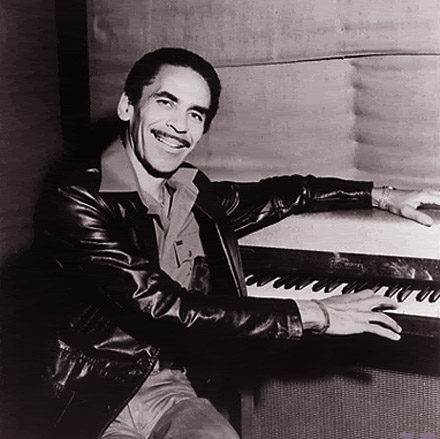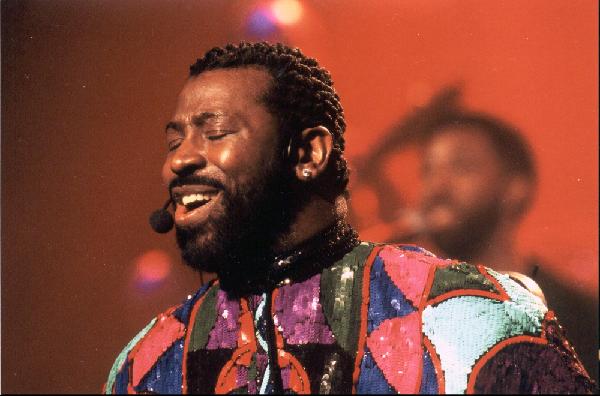Lessons In Soul, Taught by Masters
Remembering Willie Mitchell and Teddy Pendergrass
By Billy AltmanIt seems that virtually every month now, it's our sad duty to report the passing of important and influential figures from the music world. And January 2010 has proven to be an especially difficult one for the rhythm and blues community, with the deaths in successive weeks of producer Willie Mitchell and singer Teddy Pendergrass—two true titans who between them not only spanned soul music's 1960s/'70s heyday but also helped define the distinctive sounds of their respective hometowns, Memphis and Philadelphia.
Pick up any of Al Green's hit albums from the early 1970s and right next to the Hi Records logo is another one in the shape of a diamond. It says M over S, and between the two letters, simply, "The Memphis Sound." That sound, of course, was also the Mitchell Sound, a masterful blend that on such classics as "Call Me," "Let's Stay Together" and "Love and Happiness" framed Green's smoldering, taut vocals with impeccably smooth and subtle strings, horns and rhythm sections. That brilliant balance of hot and cool was no accident: the Mississippi-born, Memphis-raised Mitchell honed his talents as a trumpeter/arranger/bandleader throughout the 1950s and '60s while also developing into a skillful engineer and producer for locally owned Hi Records, which he took over in 1970 after the sudden death of label founder Tom Coughi. As with the case of Memphis' other fabled independent labels, Sun and Stax, Hi's reputation was built around its Royal Studios, where Mitchell and his house band, which featured the venerable Hodges Brothers (Leroy on bass, Charles on keyboards and Tennie on guitar) along with Stax vets Wayne Jackson (trumpet), Andrew Love (sax) and Booker T and the MGs drummer Al Jackson, crafted a uniquely unmistakable, and unmistakably Memphian, sound.
Willie Mitchell, ‘Everything’s Gonna Be Alright,’ with Don Bryant on vocals (Bryant later married Ann Peebles) and Mitchell on trumpetThough he was best known for his long association with Green, Mitchell was also responsible for such memorable Hi recordings as Syl Johnson's original version of "Take Me To The River" (later covered by Talking Heads) and Ann Peebles' "I Can't Stand The Rain," as well as arrangements and engineering/production credits over the last four decades for everyone from Rod Stewart and Keith Richards to Boz Scaggs and John Mayer. In 2004, the stretch of Lauderdale Street in front of still-running Royal Studios was renamed Willie Mitchell Boulevard, and in 2008 he received a lifetime Trustee's Award from the Grammy Foundation. And while he'd been in ill health since last fall, the 81-year-old Mitchell nonetheless was working pretty much right to the end: in addition to scoring Rod Stewart's latest collection, he produced Solomon Burke's forthcoming CD. Perhaps the most emblematic story about Willie Mitchell is that when he and Green reunited in the studio in 2003 for Rev. Green's secular comeback album I Can't Stop, Mitchell had him sing through the same microphone they'd used 30 years earlier on all their hits. As they say: If it ain't broke, don't fix it.
If Willie Mitchell was the behind the scenes wizard of Memphis soul, then Teddy Pendergrass was surely the pied piper of Philadelphia soul. Born in South Carolina, Pendergrass came to Philadelphia as an infant, and almost as soon as he was talking, he was singing: his mother stood him on a chair at age two so he could see and sing along with the choir at the storefront church they attended. Philly's ever-vibrant r'n'b scene also attracted young Pendergrass' attention, and after teaching himself how to play drums, he began playing with various combos, which eventually led him to join the backing band for longstanding vocal team the Blue Notes, led by Harold Melvin. In 1970, the 20-year-old Pendergrass left his drum kit to become the group's lead singer, and when writers/producer Kenny Gamble and Leon Huff signed the Blue Notes to their up-and-coming Philadelphia International label, they heard in Pendergrass' throaty baritone the perfect vehicle for their self-described Sound of Philadelphia: the tradition-rich rhythmic mix of church and street, harmony and groove that was Philly soul.
Teddy Pendergrass, ‘Close the Door,’ Apollo Hall of Fame concert, 1993From 1972 to 1976, the Pendergrass-fronted Blue Notes scored hit after hit with songs that provided the soundtrack for the era's burgeoning mirror ball-accented dancefloor movement: "The Love I Lost"; "Bad Luck"; "Satisfaction Guaranteed"; "Wake Up Everybody." On all these uptempo tracks, as well as ballads like the heartrending "If You Don't Know Me By Now," Pendergrass straddled the line between the sanctified and the secular as few others before or since, and as Gamble and Huff and their MFSB studio team blew up the songs into lengthy extravagant productions, Pendergrass' preacher-like exhortations over the churning music served as the glue that held everything together.
Of course, throughout much of this period, casual listeners thought that Harold Melvin was the lead singer since it was his name on the label, not Teddy's. Eventually, Melvin conceded some room, but the mouthful billing of "Harold Melvin and the Blue Notes Featuring Teddy Pendergrass" wasn't quite enough to satisfy the group's star performer, and eventually Pendergrass left to pursue a solo career that, throughout the late '70s and into the early '80s, positioned the man the ladies dubbed "Teddy Bear" as one of R&B’s sexiest male superstars. And then the unthinkable happened: In March 1982, Pendergrass' car smashed into a highway divider near him home, leaving him paralyzed from the chest down. Remarkably, he recovered enough to resume his singing career, from a wheelchair, and he continued to register hits throughout the next two decades, including the Number One songs "Joy" (1988) and '91's "It Should've Been Me." Befitting the essential elements of his singular style, what he'd lost in physical strength as a vocalist he more than made up for with the indomitable spiritual power at his core.
Complications from colon cancer surgery last summer proved too much to overcome for Pendergrass, who died at age 59 on January 13, just a little over a week after Willie Mitchell left us. As stated before, they were connected by time as well as by place: each helped teach the world about the heart of their beloved American hometowns—and what the word soul really means.
Founder/Publisher/Editor: David McGee
Contributing Editors: Billy Altman, Laura Fissinger, Christopher Hill, Derk Richardson
Logo Design: John Mendelsohn (www.johnmendelsohn.com)
Website Design: Kieran McGee (www.kieranmcgee.com)
Staff Photographers: Audrey Harrod (Louisville, KY; www.flickr.com/audreyharrod), Alicia Zappier (New York)
E-mail: thebluegrassspecial@gmail.com
Mailing Address: David McGee, 201 W. 85 St.—5B, New York, NY 10024



